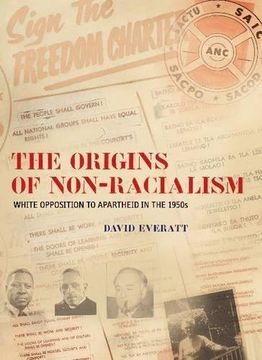The Origins of Non-Racialism: White Opposition to Apartheid in the 1950S (en Inglés)
Reseña del libro "The Origins of Non-Racialism: White Opposition to Apartheid in the 1950S (en Inglés)"
The Constitution of post-apartheid South Africa declares the Republic to be 'a sovereign, democratic state' founded on 'human dignity, the achievement of equality and the advancement of human rights and freedoms; non-racialism and non-sexism'. After centuries of white domination and decades of increasingly savage repression, freedom came to South Africa far later than elsewhere in the continent - and yet was marked by a commitment to non-racialism. Nelson Mandela's Cabinet and government were made up of women and men of all races, and many spoke of the birth of a new 'Rainbow Nation'. How did this come about? How did an African nationalist liberation movement resisting apartheid - a universally denounced violent expression of white supremacy - open its doors to other races, and whites, in particular? At what cost to itself? And what did non-racialism mean - why could whites, coloureds and Indians not join the African National Congress (ANC) until after 1990, when the ANC was unbanned, but had to remain racially discrete 'partners' - while fighting for a non-racial future? Why could members of all races join the Communist Party and the Liberal Party - but not the ANC? This book uncovers some of the stories and hidden histories that help explain our past. It focuses on a talented, brave, but tiny minority of whites - liberals, radicals, communists, Trotskyists, humanists, Christians, idealists - who rejected the growing racism of post-war South Africa and worked to breach the dividing line between black and white. From the Torch Commando, which could mobilise tens of thousands of whites at the beginning of the 1950s, to the Liberal Party and Congress of Democrats, which could boast only a few hundred members by the end of the decade, white activists fought to maintain the vision of racial equality in an increasingly divided society. Their African nationalist allies fought a harder battle within the ANC and other organisations, under growing pressure from Africanists and others, to keep alive the notion that black and white could struggle together and could live peacefully side by side. Together, black and white activists developed a theory of struggle and ways of mobilising that somehow kept alive the ideal of a non-racial South Africa. The democratic state ushered in after 1994 can be traced back directly to the work they undertook in the 1950s and after.

